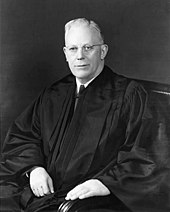
Back محكمة وارين Arabic Warren-Gericht German Warren Court Spanish Pengadilan Warren ID A Corte de Warren Portuguese Warren Court SIMPLE 沃伦法院 Chinese
| Warren Court | |
|---|---|
 | |
| October 5, 1953 – June 23, 1969 (15 years, 261 days) | |
| Seat | Supreme Court Building Washington, D.C. |
| No. of positions | 9 |
| Warren Court decisions | |
 | |
The Warren Court was the period in the history of the Supreme Court of the United States from 1953 to 1969 when Earl Warren served as the chief justice. The Warren Court is often considered the most liberal court in U.S. history.
The Warren Court expanded civil rights, civil liberties, judicial power, and the federal power in dramatic ways.[a] It has been widely recognized that the court, led by the liberal bloc, created a major "Constitutional Revolution" in U.S. history.[2][3][4][5][6]
The Warren Court brought "one man, one vote" to the United States through a series of rulings, and created the Miranda warning.[7][8][9] In addition, the court was both applauded and criticized for bringing an end to de jure racial segregation in the United States, incorporating the Bill of Rights (i.e. including it in the 14th Amendment Due Process clause), and ending officially sanctioned voluntary prayer in public schools. The period is recognized as the most liberal point that judicial power had ever reached, but with a substantial continuing impact.[b][c]
- ^ Sunstein, Cass Breyer's Judicial Pragmatism University of Chicago Law School. November, 2005. pg. 3-4.
- ^ Pederson, William D. "Earl Warren". www.mtsu.edu. Retrieved 2019-09-15.
- ^ Horwitz, Morton J. (Winter 1993). "The Warren Court And The Pursuit Of Justice". Washington and Lee Law Review. 50.
- ^ Driver, Justin (October 2012). "The Constitutional Conservatism of the Warren Court". California Law Review. 100 (5): 1101–1167. JSTOR 23408735.
- ^ Powe, Jr., Lucas A. (2002). The Warren Court and American Politics. Harvard University Press.
- ^ Swindler, William F. (1970). "The Warren Court: Completion of a Constitutional Revolution" (PDF). Vanderbilt Law Review. 23.
- ^ "Biography of Earl Warren". warren.ucsd.edu. Retrieved 2019-10-04.
- ^ "One Person, One Vote | The Constitution Project". www.theconstitutionproject.com. Retrieved 2019-10-04.
- ^ "Miranda v. Arizona". Oyez. Retrieved 2019-10-04.
- ^ a b Sunstein; Breyer’s Judicial Pragmatism, p. 4
Cite error: There are <ref group=lower-alpha> tags or {{efn}} templates on this page, but the references will not show without a {{reflist|group=lower-alpha}} template or {{notelist}} template (see the help page).